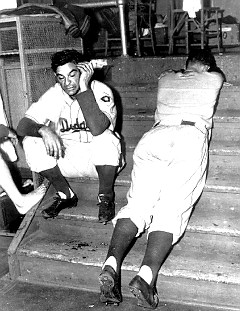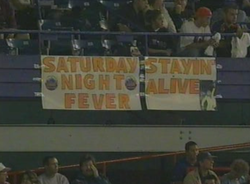Click here for an intro/manifesto on The 1999 Project.
For the second straight season, MLB would have a one-game playoff to decide the winner of the wild card. In 1998, the Mets could have been a part of that playoff–or made the playoff unnecessary by winning the wild card outright. They were not able to do either, as everyone reminded them all year. But in 1999, they pulled themselves back from the brink of disaster, and now they found themselves in Cincinnati for a winner-take-all contest at Cinergy Field (formerly known as Riverfront Stadium).
The game was originally scheduled for a 2:05 start, but was moved up to 7 in the evening to accommodate the bleary-eyed Reds. They waited out a five hour, 47 minute rain delay in Milwaukee, all the while knowing they had to win to keep their season alive. Much like the Mets, they rallied after a near collapse.
Unlike the Mets, the Reds had few expectations placed on them at the beginning of the year. All they had was a meager $33 million payroll and no real superstars, save maybe team captain Barry Larkin. They shocked baseball by not only being competitive throughout the season, but remaining in playoff picture. They got hot in September, threatening the postseason plans of both the Mets and the Astros, before stumbling against the Brewers in the final weekend.
The Reds’ manager, Jack McKeon, was much older and much more old school than the Mets’ skipper. His team did not celebrate on the field once they finally defeated the Brewers in the last scheduled game of the year. (“What were we going to celebrate?” he asked. “We didn’t win anything.”) But he was fond of trying Bobby V-style gamesmanship. In their head-to-head meetings, McKeon twice pointed out some obscure technicality to the umpires, forcing a Mets pitcher to change his uniform or some piece of equipment (and thoroughly annoying Valentine).
He also had one more glaring similarity with Bobby Valentine. In 11 seasons of managing, which included stints in Kansas City, Oakland, and San Diego, McKeon had never managed in the postseason.
Someone’s unfortunate streak would end here.
Continue reading 1999 Project: Game 163
 The Giants had just completed a monumental comeback. The Dodgers had just completed a monumental collapse. A heartbreaking photo appeared in the papers next day, showing Branca slumped forward on the clubhouse steps, paralyzed by guilt and grief, knowing he was the architect of yet another Brooklyn choke job.
The Giants had just completed a monumental comeback. The Dodgers had just completed a monumental collapse. A heartbreaking photo appeared in the papers next day, showing Branca slumped forward on the clubhouse steps, paralyzed by guilt and grief, knowing he was the architect of yet another Brooklyn choke job.